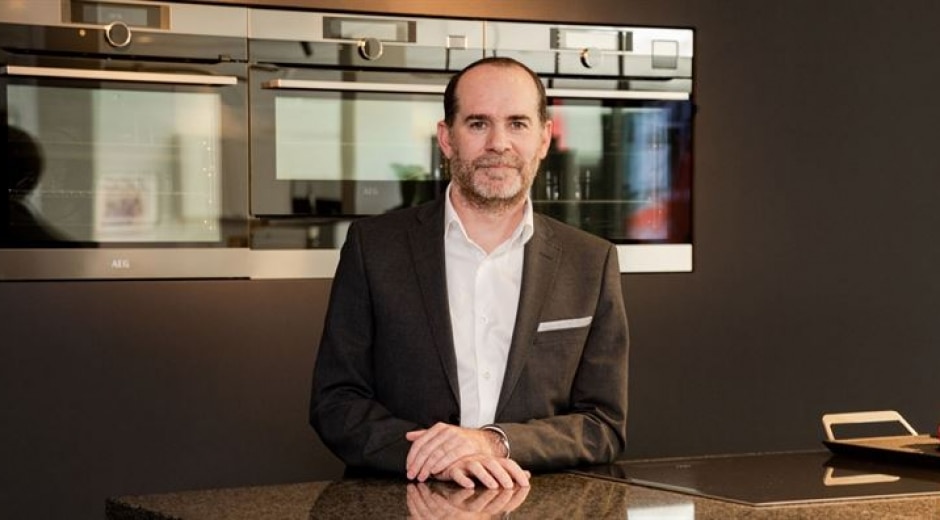Our new Chief Design Officer Simon Bradford is at leading kitchen design show EuroCucina this week launching our sustainable kitchen concept GRO. He explains how GRO could help protect the health of the planet, the big trends affecting the world of design today and why designers should jump at the opportunity to work at Electrolux.
You’re at EuroCucina to introduce GRO. Tell us more.
Ultimately the question we are putting out there is: Can sustainable eating save the world? We think it can and we want to use the opportunity of our presence at the biggest design event in the world to showcase the vision of a kitchen 10 years out, which could enable users to lead more sustainable eating habits.
The concept brings attention to the fact that today’s food industry is broken, with damaging effects on the climate, our fragile eco-system and our health. Right now, one third of carbon dioxide emissions come from the food industry, and our diets are unhealthy.
On top of that, one third of the food in our fridges gets thrown out. This is mainly due to a lack of visibility of the ingredients we already have and also because produce is not kept in the right conditions.
How could GRO address this imbalance?
For food to keep its freshness the longest, it ideally needs to be kept in the right levels of temperature, humidity, and lighting. Currently it is very difficult for a fridge to do all three parameters at once because every ingredient is not the same. This led us to modularize the concept of a kitchen. Each module represents a cooling unit, optimized to either keep leafy greens, roots vegetables, cereals or animal proteins at exactly the right preservation conditions. When assembled together it creates quite a striking composition – adaptable to every home and person – that will hopefully spark interesting conversations.
What’s been at the top of your agenda since starting in your role?
It is a new role for me, but I have been working for quite a while at Electrolux Group in various leadership roles so I’ve been able to hit the ground running.
The biggest priority has been to speak and meet as many people as possible within COVID restrictions. We have seven design offices around the world which gives us a deep understanding of our consumers at a regional level. Only recently I was able to spend two weeks with the design teams in Charlotte, North America and Curitiba, Brazil. After two years of being grounded, it was a great experience meeting so many new and old faces!
In addition to that, getting a good understanding of all the main projects running across the studios was top of the agenda. At the core I am still a designer and very passionate about the solutions we bring to consumers to improve their everyday lives.
Can you tell us more about Human Touch, the design philosophy at Electrolux?
Our philosophy brings a human-centric, iterative and research-based approach to the way we do things. Our aim is to bring distinctive and sustainable consumer driven branded experiences to market that will shape the lives of our consumers and humanity for the better.
What big trends are shaping the world of design today?
- Modularity: The post COVID era is having a huge impact on global economics, with supply chain disruptions and component shortages. Modularity and the platformization of the way we design consumer experience will be essential in order to be able to scale, integrate with ease and efficiency.
- Extended end of life: Products will be expected to last longer. Growing legislation led by governments and consumer groups around the Right to Repair, are seeking solutions from companies for easy repairability, traceability and so forth. Design will need to envision designing solutions for refurbishing, upcycling & end of life.
- Unobtrusive technology: In two years of COVID we leapfrogged seven years in digital savviness. User interfaces are to be more and more minimalist and self-explanatory without sacrificing functionality. Technology will become omnipresent, especially in the home, with solutions moving towards consumer prediction and understanding how people are living.
- Life-Centered: The experiences that we design need to be first and foremost human. The industry is shifting from consumer-centric to a more design-for-life approach taking into consideration all aspects of a person’s life. We need to design with wellness in mind. We play an active role in nudging healthy behaviour of all sorts.
And finally, why should designers want to come and work at Electrolux?
Like the mobile industry and the automotive industries before us, the home appliance sector is going through a very exciting transformation right now, fuelled by digitalization and climate change. Appliances of today are very energy and water efficient and have many great features, but if you think about it, the overall look of an oven or a washing machine has not changed so much in the last 30 years. Then in the last five years we have seen huge transformations in the way people source, prepare and consume food, as well as a crucial need to care for resources such as water and power.
On top of that, the home has become our sanctuary more than ever before since the pandemic. And every home has an appliance. So as a designer at Electrolux you really can make a difference in people’s daily lives.
We also pride ourselves on our diversity and inclusion agenda. Within the design team in Stockholm alone we have 23 different nationalities all working to shape the lives of our user for the better.
So anyone who wants to be part of an industry in transformation, cares about people and the planet and wants to be part of a diverse team in every sense of the word, I can’t think of a better place to be.



